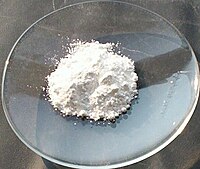
Photo from wikipedia
ABSTRACT Gastrodin (GAS) is a predominant bioactive constituent of the Chinese herbal medicine Tianma (Gastrodia elata Blume). Many authors have reported GAS has the beneficial effect on diverse diseases of… Click to show full abstract
ABSTRACT Gastrodin (GAS) is a predominant bioactive constituent of the Chinese herbal medicine Tianma (Gastrodia elata Blume). Many authors have reported GAS has the beneficial effect on diverse diseases of the CNS, including epilepsy, Alzheimer’s disease, Parkinson’s disease, and cerebral ischemia. Here, we report GAS exhibited a robust neuroprotective effect in an Sprague-Dawley rat model of stroke (transient middle cerebral artery occlusion, tMCAO), and show that the underlying molecular mechanism involves its protective effect against Zn2+-toxicity and its anti-oxidative effects in astrocytes. Intraperitoneal administration of GAS (40 mg/kg) after MCAO reduced mean infarct volume to 30.1 ± 5.9% of that of MCAO controls and this neuroprotective effect was accompanied by neurological function recoveries which was measured using modified neurological severity score (mNSS). Interestingly, GAS induced up-regulation and nuclear translocation of Nrf2, and subsequently increased the expressions of anti-oxidative genes, such as, HO-1 and GCLM, in astrocytes. Furthermore, GAS co- or pre-treatment markedly suppressed Zn2+-induced cell death caused by excessive ROS production and PARP-1 induction. We found that GAS suppressed p67 expression and PAR formation in astrocytes, which might underlie the anti- Zn2+-toxicity and anti-oxidative effects of GAS in astrocytes. These findings indicate GAS protects astrocytes from Zn2+-induced toxicity and oxidative stress and these effects contribute to its neuroprotective effects in the postischemic brain.
Journal Title: Animal Cells and Systems
Year Published: 2018
Link to full text (if available)
Share on Social Media: Sign Up to like & get
recommendations!